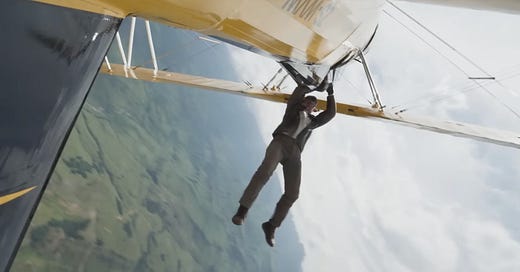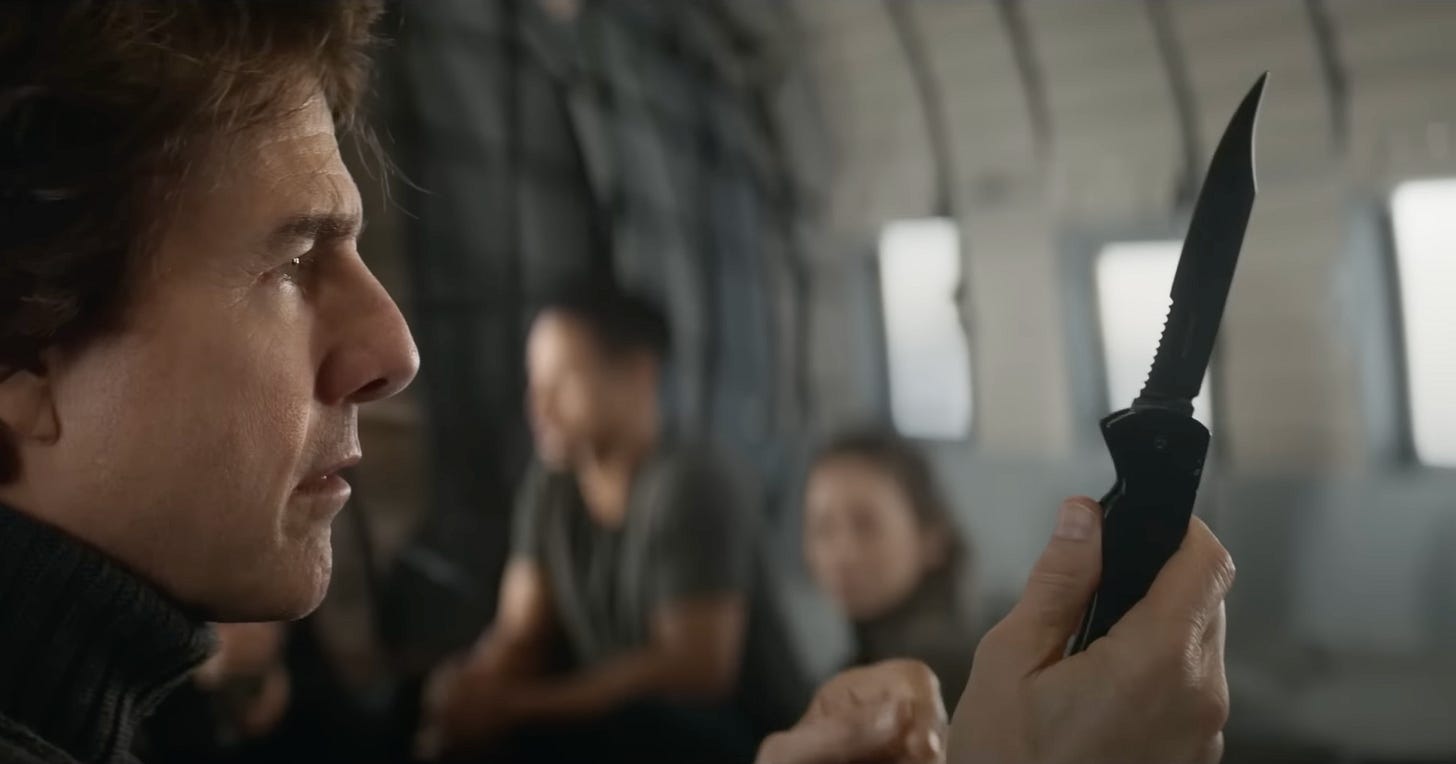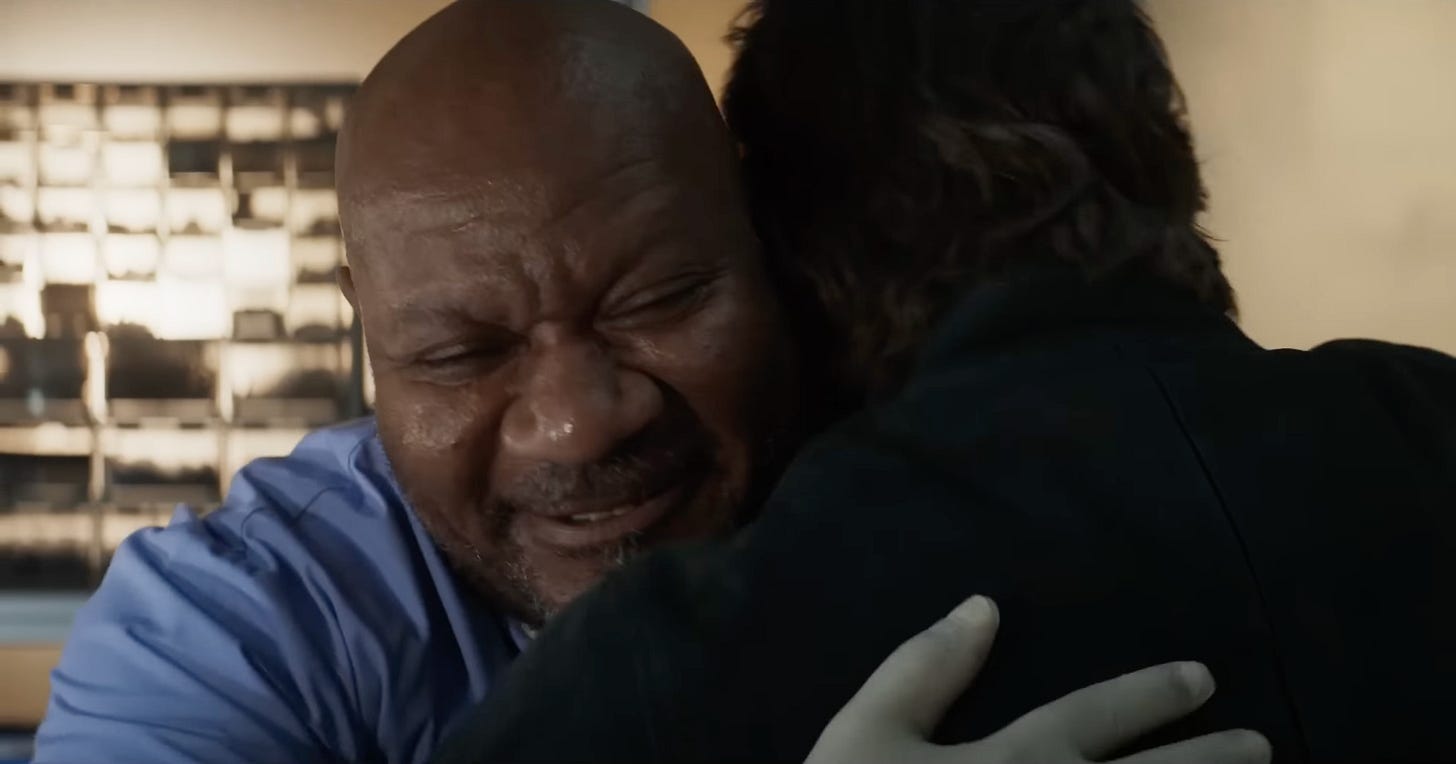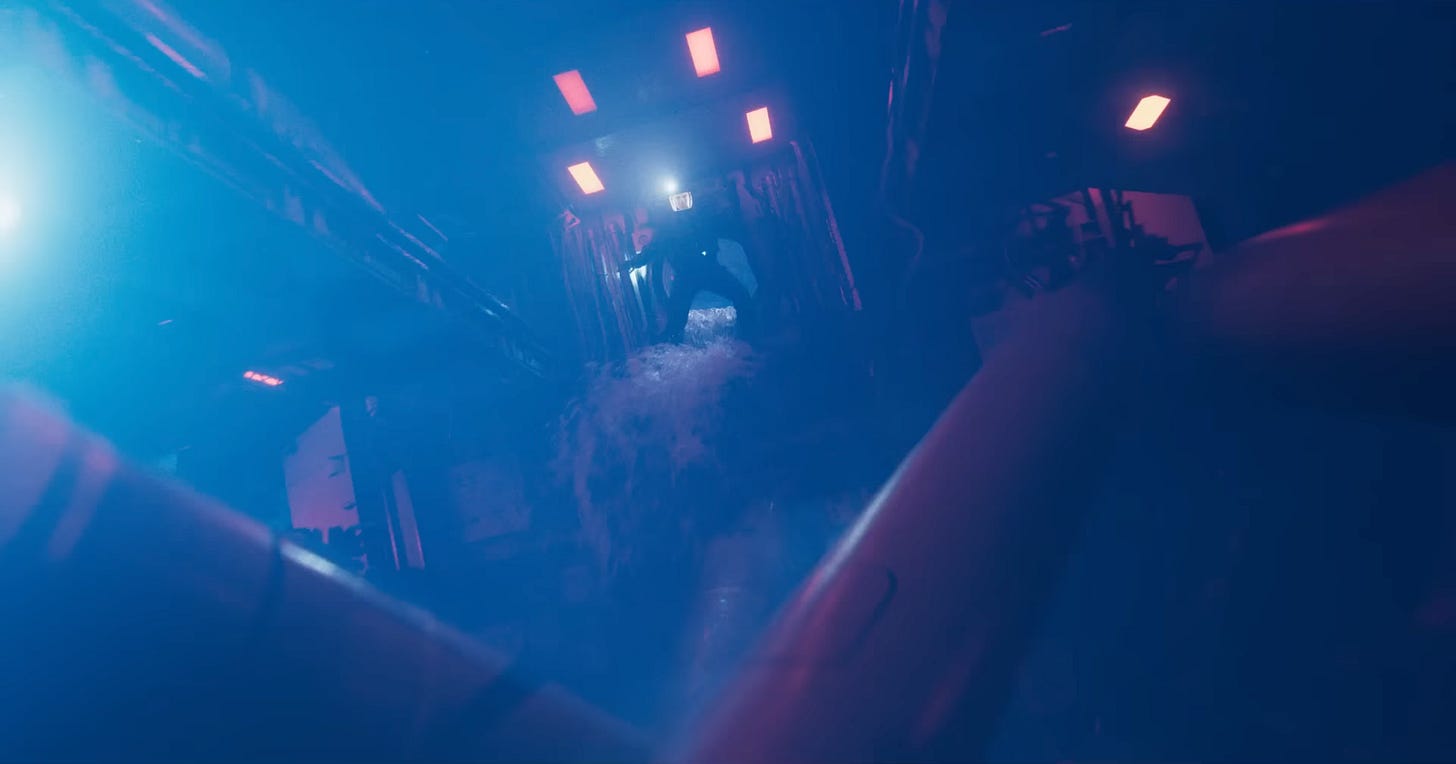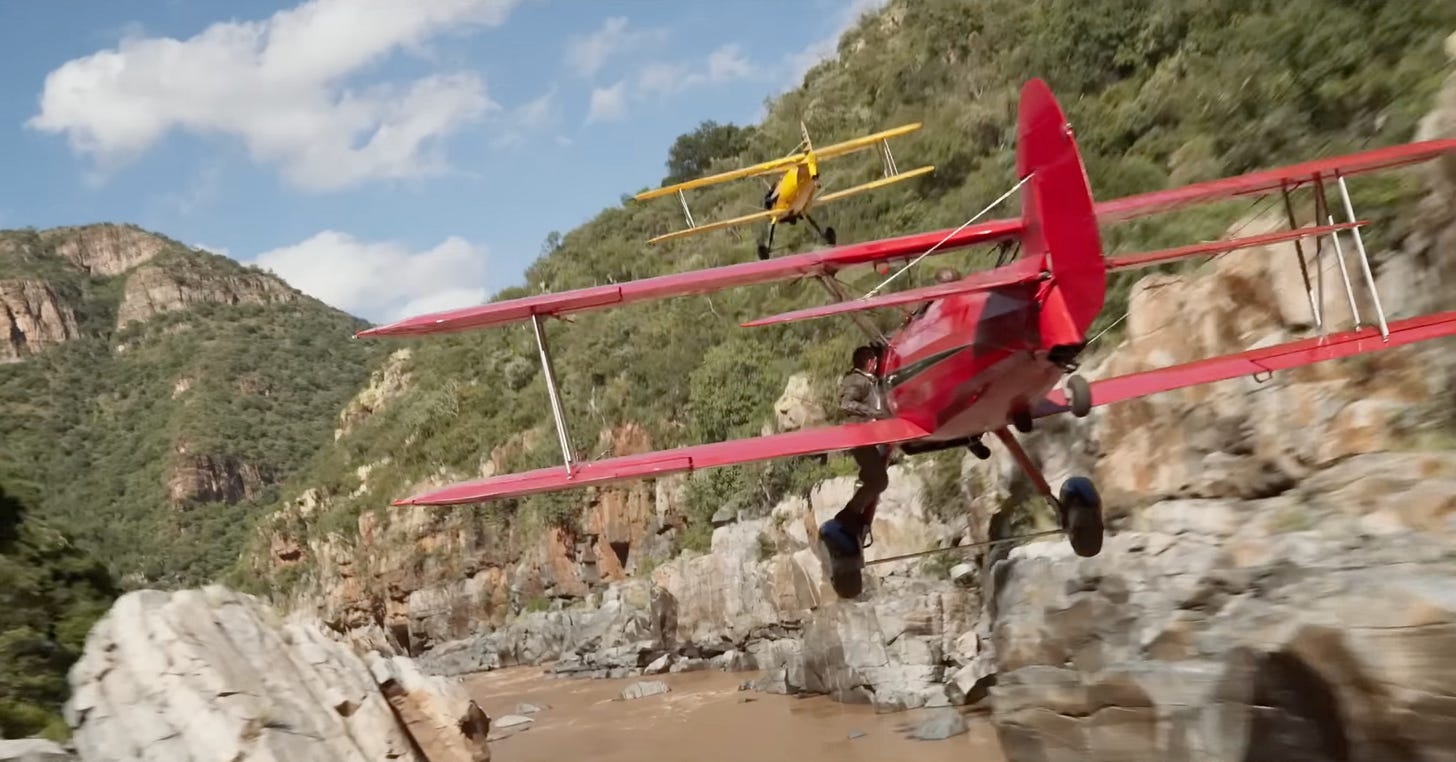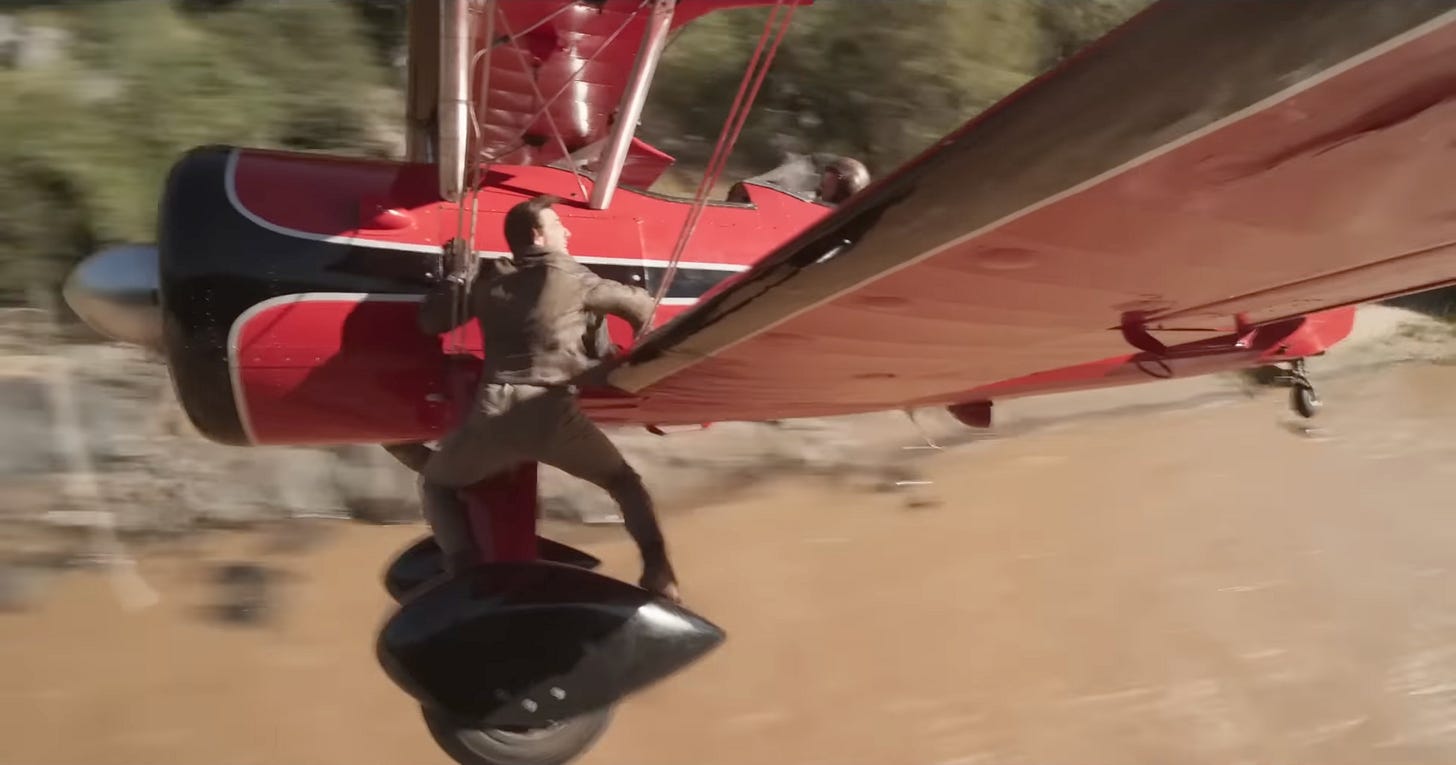Review: "MISSION: IMPOSSIBLE - THE FINAL RECKONING" is a messily exhilarating goodbye
For me, at least, the series sticks the landing
“Our lives are the sum of our choices. I have no regrets. Neither should you.”
Amen, Luther. Amen.
What do we want out of an ending? After all, our culture is more obsessed with them than ever today, to the point that open-ended episodic TV series are an endangered species, and movie franchises that once played out with zero to minimal continuity contort themselves into very conclusive shapes (for the ultimate example, see Daniel Craig’s James Bond, once the cinema’s ultimate immortal being, very definitively dying in 2021’s No Time to Die). Do we desire a sense of ultimate finality, a funereal narrative turn that tells us this story is done, gives us space to grieve it, and then beckons us to let it go? Or do we want a finale that re-articulates why the story mattered in the first place, concluding the narrative by affirming both its foundational import and the way that sense of purpose evolved over time? Or put another way: do we yearn for an ‘ending’ because we want a narrativized excuse to let a story go, a destination that made the journey feel worthwhile, or do we look to endings to narratively contextualize why we cared along the way? Not to tell us the journey is ‘over,’ but to stop and reflect on why the journey itself was so important?
That may sound like a subtle difference, but I would argue the second option is substantially trickier. One can always achieve finality by being ruthless: kill the main character and have the survivors huddle to mourn their death, and it’s pretty easy for all involved to close the book (a reality Marvel has been grappling with ever since they let much of their audience say goodbye and walk away in Avengers: Endgame). But to have the protagonist limp away from the action, able to fight another day, the finality coming not from their ultimate departure from their fictional diegesis, but from our sense that we, as viewers, have come full circle enough to say goodbye and let this character live on in our imaginations? That’s a lot harder. Pulling it off is a sort of magic trick.
And as I’ve told you before, Ethan Hunt is a big fan of magic tricks.
For me, Mission: Impossible – The Final Reckoning sticks the landing. It does not do so perfectly, and it is not always graceful on its way to the end, but within the giant, sprawling, undeniably messy creativity of this last chapter, I felt that second kind of finality: the kind that tells me the artists making this series love and understand it in the same way I’ve long loved and understood it. It delivers the kind of ending that brings closure through a heartfelt, thoughtful attempt to crystallize the thematic and stylistic core of Mission: Impossible. When I walked out of the theater, heart still racing and breath still short from the truly next-level kineticism The Final Reckoning engages in, I felt the magic of this series in full force, recontextualized as a messily exhilarating goodbye.
‘Messy’ is one of the operative words here, because The Final Reckoning is by no means immune to the gravity that sets in when one becomes self-conscious about giving meaning to thirty years of action and storytelling. The film takes a long while to rev up, only setting Cruise’s Ethan Hunt off on this film’s actual mission after about an hour of set-up that will inevitably test some viewers’ patience to varying degrees. The first act is built around a complex time-hopping montage structure that is, I think, pretty formally accomplished – there’s a lot of very good cross-cutting in this film, courtesy the always-great Eddie Hamilton, unifying characters in purpose even if they are apart in time or space – while also feeling undeniably unwieldly, overburdened with recapitulating plot from Dead Reckoning (originally this film’s “Part One,” the anxiety that led to not calling this one “Part Two” palpable in some awkwardly inserted flashbacks), and unable to find the exact right balance between setting up this film’s specific stakes and giving retrospective weight to the long journey that got us here. There are a lot of characters to introduce or re-introduce – too many, particularly on the US government/military side of things – and the film is too preoccupied with putting players on the board when it needs to start moving those pieces around earlier and more propulsively. Apart from a very effectively creepy encounter early on, the ‘Entity’ – this film’s AI antagonist threatening the world – is never characterized or thematized as effectively as it was in Dead Reckoning, while its human counterpart, Esai Morales’ Gabriel, never comes together as a character the way that film suggested he would (The Final Reckoning ultimately lands on ‘Saturday morning cartoon villain,’ which is entertaining, if a little disappointing).
To be clear, there is a lot I like in the film’s first half, including a few truly outstanding character moments that are disarming in their frank maturity. As overstuffed as the cast becomes, there are so many highlights worth celebrating, from Pom Klementieff reprising her scene-stealing role from Dead Reckoning, now nearer center stage as a member of Ethan’s team; to a memorable, very entertaining turn from Tramell Tillman as a submarine captain who seems positively tickled by Ethan’s insanity; to Hayley Atwell gamely continuing her role as Ethan’s protégé/co-lead as Grace; to some of Simon Pegg and Ving Rhames’ best work in their many years with this series. There are certainly characters I would cut from the film for the sake of narrative streamlining – Hannah Waddingham and Nick Offerman are both mostly wasted in parts that feel like unfinished sketches – but I continue to admire the series’ commitment to expanding the world around Ethan; it feels right that the extended cast keeps developing even here at the end, and in some cases, it pays real dividends.
The sprawl of The Final Reckoning extends not only from narrative excess, but equally from efforts to continue and enrich themes Cruise and writer/director Christopher McQuarrie have been interested in since they joined forces for Rogue Nation: namely, what are the ‘choices’ Ethan makes, why does he make them, and how does someone who so regularly carries the world on his shoulders balance choice and consequence? Early reviews that accuse the film of an obsession with tying every inch of the series together, a la Avengers: Endgame, are hyperbolic: The Final Reckoning is most in conversation with Dead Reckoning, its immediate predecessor and would-be ‘Part One,’ brings back a character from the original Brian De Palma film, and nods to an unresolved plot point from the third movie; at no point does it do the Spectre thing where all of James Bond’s challenges came from one singular source of evil. Still, it’s fair to say that long-time fans, ones who enjoy revisiting these films and find themselves connecting not just with the action, but with the characters and ideas at play too, will enjoy this all quite a bit more than casual viewers. And for a series that had been very friendly to newcomers in each of its previous seven installments, that’s absolutely an issue worth mentioning.
What’s undeniable is that when The Final Reckoning is fully engaged, it is an astonishing cinematic feat to behold. Pay-off matters more than set-up, and if this film’s set-up is at times unwieldly, the pay-off – the places these characters are headed, and what they do when they get there – is proportionally spectacular. Ethan’s long-promised journey to the Sevastopol submarine, teed up from the opening minutes of Dead Reckoning, results in perhaps the greatest extended set-piece in a franchise notoriously full of them, a formal masterwork of desperation and suspense so adroit at visual storytelling that exactly two words are spoken in the entire sequence. There are whole film studies courses to be taught about just these fifteen minutes, and how brilliantly McQuarrie captures underwater motion, plays with space and physics, and communicates character and motivation purely though kinetic engagement with the mise-en-scene.
And all of that is ultimately just the preamble for a grand finale in which Cruise and McQuarrie pull off one of the single most eye-popping stunts in cinematic history, with Cruise hanging from two separate biplanes, his body making contact with every inch of their surfaces in every contorted permutation possible, above an expansive South African landscape. The scene is an obvious recapitulation of dynamics from the climax of Mission: Impossible – Fallout, complete with Ethan’s team defusing a bomb on land while he chases the MacGuffin in the sky, and that would probably bother me if the imagery and action weren’t so goddamn spectacular that they spiked my heart rate into the danger zone. Seeing Cruise suspended above that vast green landscape, the sky perfectly clear, everything from the far-off foliage to the biplanes themselves bursting in strong warm colors, the image extending floor-to-ceiling in a larger-than-life display of cinematic grandeur, is without question the greatest use of IMAX cameras and the IMAX screen format I have ever seen. Eat your heart out, Christopher Nolan. Mission: Impossible is King.
Of course, set pieces alone, even ones as singularly accomplished as these, do not make a movie – or an ‘ending’ – all on their own. They are a part of why I say The Final Reckoning sticks the landing for me – it matters that the action in the final Mission: Impossible feels more, well, impossible than ever before – but the real way this series stole my heart, one last time, comes after the dust settles, in the film’s extremely moving denouement. Here is where Cruise and McQuarrie tap into the magic of that second kind of ending, the one that eschews a definitive ‘destination’ in favor of re-articulating the import of the journey. There are two key gestures that tie it all together for me: A beautiful little handshake that speaks volumes without a single word, and an eloquent closing monologue from a well-loved supporting character. In those two gestures, I saw the series reflecting back to me core pieces of what I always loved most about it. Almost literally, in the case of the monologue, which includes the line “Any hope for the future comes from willing that future into being.” It is almost verbatim something I wrote in my retrospective piece on Fallout, part of a paragraph I’d written early in the process of drafting those pieces, and that kept hopping around to different reviews before I finally settled on including it in my thoughts on the sixth film. Which is to say that it is the most all-encompassing expression I found myself writing on what these films mean to me:
Ethan isn’t just the guy who accepts impossible missions: he’s the guy who will make missions impossible by insisting on doing them without collateral damage. But instead of ever framing this as a weakness on Ethan’s part, each [film frames] Ethan’s insistence on never taking the easy way out as aspirational … Hunt is a character originally created in the Clinton 90s, but I think he wound up surviving to be one of the perfect heroes of the Trump years, decades later, because of how strictly he holds to a core set of humanist, empathetic values, willing the world he wants into being by refusing to believe there is a shortcut to saving lives … And after years spent living in an era where vice has supplanted virtue as the core thing so many political and cultural leaders espouse, that doesn’t feel self-aggrandizing or messianic to me. It feels like hope.
If it somehow isn’t obvious yet, I am clearly on the same wavelength as Cruise and McQuarrie when it comes to these films. I have been 100% locked in since the opening moments of Rogue Nation, and I have been as vocal a cheerleader for their work together as you will find. I love watching them work; I love the sheer amount of creativity and craftsmanship on display in these films, and I especially love the enthusiasm with which they go about imagining and executing on big ideas. I care about that palpable sense of effort, even when it leads to structural wonkiness and narrative excess; it’s not an accident, after all, that the series itself values Ethan’s own indefatigable exertion, even and especially when he makes the job harder for himself, above all other heroic virtues. Our lives are the sum of our choices, and the product of the effort we put in; through that effort, we will the world – and the films – we want into being. The striving is in and of itself beautiful, and heroic.
Your mileage will of course vary. I cannot, after all, review this film as anyone other but myself. So when I heard those words coming out of that character’s mouth, after watching some of the best action filmmaking produced in my lifetime, as Ethan clasps hands with a would-be enemy in a final visual symbol of the series’ earnest belief in friendship, trust, and redemption…well, yeah. It worked for me. Of course it worked for me. Here is much of what I always loved most about this series, the series I have called my favorite film series of my lifetime, stated and visualized plainly and persuasively as all involved say goodbye.
Mission: accomplished, indeed.
MISSION: IMPOSSIBLE MOVIES, RANKED:
1. Mission: Impossible – Dead Reckoning
2. Mission: Impossible – Fallout
4. Mission: Impossible – Rogue Nation
5. Mission: Impossible – The Final Reckoning
Read the book 200 Reviews by Jonathan R. Lack in Paperback or on Kindle
Subscribe to PURELY ACADEMIC, our monthly variety podcast about movies, video games, TV, and more
Like anime? Listen to the podcast I host with Sean Chapman, JAPANIMATION STATION, where we review all sorts of anime every week. Watch on YouTube or Subscribe wherever you get your podcasts.

